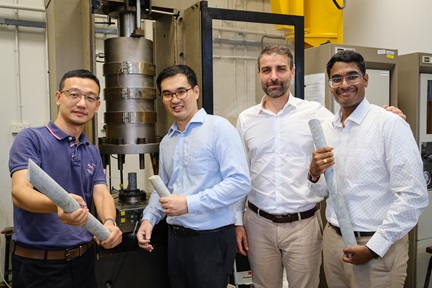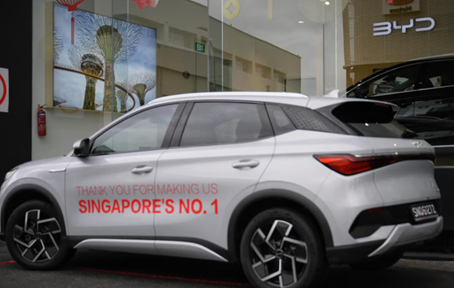Amid push for electric vehicles, getting charging points installed in condominiums remains a challenge
First published online at CNA
 Charging spaces for electric vehicles in Singapore. (Photo: Zhaki Abdullah)
Charging spaces for electric vehicles in Singapore. (Photo: Zhaki Abdullah)
SINGAPORE: Mr Adrian Peh bought his second-hand Tesla in 2016, having seen one during a trip to the United States three years earlier.
He said he was attracted by the electric vehicle (EV) being a “cool gadget car” that also allowed him to do his part for sustainability.
However, his condominium in Singapore did not have a charging point for electric vehicles, and he was only able to get one installed in 2019.
“They were supportive, but needed an AGM (annual general meeting),” said the 48-year-old who is chief executive of a financial advisory firm.
Under the Building Maintenance and Strata Management Act, the installation of facilities such as EV chargers is subject to voting and approval of a special resolution tabled at an AGM.
Mr Peh said he had requested the installation of a charger shortly after one AGM, and had to wait until the next meeting for the matter to be raised.
“And then they took a while to fix it,” he said, adding that he used public EV chargers in the meantime.
There are no official figures for how many condominiums here have EV chargers, although charging facilities provider Greenlots told CNA last year that condominiums have been “quite slow” to introduce EV charging stations.
According to the website for Greenlots - owned by Dutch energy giant Shell - its chargers are installed or approved for installation at 22 condominiums as of February 2019, with another 11 in “ongoing discussions”.
The website also stated that eight condominiums had rejected a proposal by Greenlots.
As part of Singapore's move to further encourage drivers to switch to electric vehicles, Deputy Prime Minister Heng Swee Keat announced in his Budget speech on Tuesday (Feb 16) more incentives to narrow the "cost differential" between electric cars and internal combustion engine cars.
Measures include lowering the Additional Registration Fee (ARF) floor to zero for electric cars from January 2022 to December 2023.
The Government has also been taking steps to boost EV charging points across the island, with the aim to deploy 60,000 points at public car parks and private premises by 2030 as announced earlier this month in the Singapore Green Plan 2030.
However, drivers said private housing developments have been slow to install charging points.
Professor Subodh Mhaisalkar, who drives a plug-in hybrid car, said his condominium had twice rejected proposals to install EV chargers.
Concerns raised at the time included the lack of residents requesting EV chargers, as well as uncertainty over how best to charge residents for the use of electricity from charging points, said the executive director of Nanyang Technological University’s Energy Research Institute.
The initial rejection prompted him to buy a plug-in hybrid instead of a fully electric car, he said.
Plug-in hybrids differ from conventional hybrid vehicles in that they have larger batteries which can be charged, allowing them to run purely on electricity for long distances.
Mr Koh Jie Meng, the director of charging infrastructure company Electric Asia, said he has installed four or five chargers at condominiums where specific parking lots are allocated to individual apartments.
Most condominiums he has approached, however, were unable to get the necessary support needed to install chargers, as most residents were unwilling to allocate lots for EV charging, given the limited number of parking spaces available.
“Not everyone is driving EVs,” he said.
Figures from the Land Transport Authority show that there were 1,274 fully-electric cars and 561 plug-in hybrids registered here as of January, making up just about 0.2 per cent of the total car population of 636,483.
BEST PRACTICES NEEDED
The business model for companies installing chargers at private developments is likely “a bit unclear” for the next few years, given that demand for EVs is still low here, said Singapore University of Social Sciences (SUSS) economist Walter Theseira.
Associate Professor Theseira, who heads the master of urban transport management programme at SUSS, also noted the risks and liabilities associated with installing charging points on shared property in condominiums.
“I think the main problem here is we don't have in Singapore a set of best practices that would govern the installation and the legal, contractual issues around it that would make all the stakeholders happy,” he said.
The Government could step in to work with companies and property owners to establish such best practices, he suggested.
Professor Subodh said he now charges his vehicle at work or at public EV chargers.
As for Mr Peh, he pointed out that using public charging points puts EV drivers at the mercy of “inconsiderate people” who park their cars - both EVs and conventional vehicles - at such lots without charging, or who do not leave after charging.
Speaking in Parliament earlier this month, MP Gan Thiam Poh (PAP-Ang Mo Kio) said new condominiums should have to allocate some parking spaces as EV charging points.
Existing condominiums should also be required to provide spaces for EV charging, said Mr Gan, who sits on the Government Parliamentary Committee for Transport as well as Sustainability and the Environment.
Prof Subodh said this is feasible as the expansion of Singapore's public transport network means fewer are likely to own cars in the future, which could lead to more parking spaces being freed up for EV charging at condominiums.
"Turning some lots which are unused into EV lots makes perfect sense," he said.
For developments which are unable to have chargers installed, he suggested the possibility of charging valets who will drive EVs to the nearest available charging point, or mobile charging units which do not need to be installed and can be moved around as needed.
Among the firms manufacturing mobile chargers are Freewire Technologies - which has raised about US$100 million in funding from investors including British oil giant BP and automaker Volvo - and Sparkcharge, which has secured US$5 million in funding since 2017.
Still, as Singapore makes a push towards phasing out petrol vehicles, EV chargers may yet be a common feature at condominiums in the future.
In January, charging infrastructure provider Charge+ - a subsidiary of solar energy solutions provider Sunseap - announced that it aims to install 4,000 charging points in 1,200 condominiums by 2030.
Charge+ has also partnered OCBC, which said it would leverage its “extensive coverage of the real estate sector to encourage its property developer and property owner customers to install charging points at their premises”.
Another provider, Urban Charge, announced last month that it would offer free EV charging units for commercial and industrial, as well as condominium building owners, who adopt solar rooftop or energy efficiency projects from its parent company, sustainable energy developer Urban Renewables.
Mr Robin Pho, the chief executive of renewable energy start-up RPRE, recently placed an order for a Tesla Model 3 and said he put in a request for EV chargers to be installed at his condominium.
He said he joined the management council of Southaven 1 condominium to “try and improve the whole condo facilities”.
The council is currently going through a digitalisation process, introducing features such as facial recognition and vehicle number recognition for security access.
“Installing EV chargers seems to be a nice natural upgrade too,” said the 42-year-old, adding that the council is now evaluating a number of proposals from various EV charging providers.
“If more switch to EVs, it’ll be better for the health of all residents in the condo. We stay near the Bukit Timah Nature Reserve providing us with very nice clean air, but it’s a pity if it’s affected by air pollution from cars,” he said.







